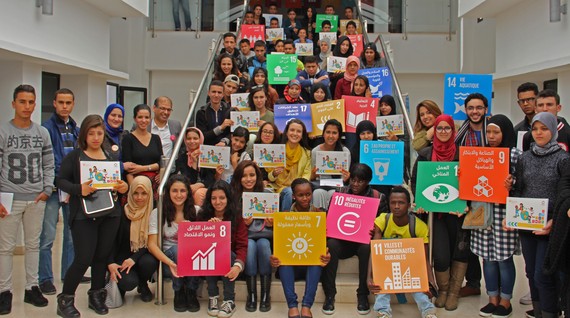The blog is co-authored by Magdy Martínez-Solimán, UN Assistant Secretary-General and Director, Bureau for Policy and Programme Support, UNDP | Omar Abdi, UN Assistant Secretary-General and Deputy Executive Director, UNICEF | Amir Abdulla, UN Assistant Secretary-General and Deputy Executive Director, WFP

Consultation with children and youth to hear their views on implementation of the Sustainable Development Goals (SDGs) in their country and contribute these ideas to the Moroccan Voluntary National Review at the High Level Political Forum in 2016 (Photo: UNICEF Morocco)
The United Nations 2030 Agenda for Sustainable Development with its 17 Sustainable Development Goals (SDGs), will guide the international community over the coming 15 years. It aspires to ensure prosperity and well-being for all people, while protecting our planet.
Following the adoption of Agenda 2030 for Sustainable Development at the September Summit in 2015, countries around the world have turned their attention to implementation. The experience with the Millennium Development Goals (MDGs) tells us that leadership, effective and inclusive policies, national and global collaboration and local engagement can go a long way in implementing the SDGs for all people: children, youth, women and men; and in all countries: rich and poor, large and small, island and landlocked states, stable nations and vulnerable countries affected by climate change, fragility and conflict.
Achieving the SDGs will require very bold new approaches. Five elements are key:
National ownership on and leadership of the SDGs is vital--If they are incorporated into national policy frameworks, plans, and budgets, and if delivery capacity is built, the SDGs stand a good chance of being achieved.
Countries will need to follow a whole-of-government approach--The goals are interconnected - often the key to success on one will involve tackling obstacles and issues more commonly associated with another. For example, a decision made in one government unit about where to construct a road could positively or negatively affect other areas of government responsibility, such as access to services (like hospitals and schools) or to economic opportunity (such as markets and supplies). Integration of policies and development initiatives is key.
Building broad coalitions around the Goals will be crucial to achieving them--Government commitment is vital, but will not be enough on its own. People, communities, and civil society groups must be able to actively and meaningfully participate. The way in which business does business will have a big impact on whether development reaches everyone and can be sustained. Academia and science needs to help us think and measure. Media has to be an ally to showcase successes, to highlight progress or the lack thereof.
All available financial resources must be drawn on for the new agenda--domestic and international, public and private, and environmental and developmental. New finance is needed if sustainable development is to happen, and the gaps are bigger than the available resources and commitment.
Every country has relevant experiences to share and new things to learn--Co-operation between countries in the Global South is playing a growing role in generating and sharing new ideas, knowledge, and technologies, and investment, and is greatly valued by developing countries.
The role of the UN system to support implementation is recognized in the 2030 Agenda as well as in the Addis Ababa Action Agenda. Since the adoption of the 2030 Agenda for Sustainable Development and the SDGs, the UN is requested by Member States to provide enhanced support. Governments are calling on the UN to help facilitate inclusive national dialogues with all members of society on SDG implementation and look to the UN for support for tracking and reporting progress towards the SDGs.
In order to better support the national SDG response, the UN Development Group in 2015 adopted a common approach "Mainstreaming, Acceleration and Policy Support--MAPS" which currently is being promoted through the UN Country Teams at the national level. Through this approach, the UN supports Member States to localize the global agenda at national level, to unblock bottlenecks to progress, and to source policy expertise from across the UN development system.
The 2016 High-level Political Forum on Sustainable Development (HLPF, 11-20 July) provides a platform for the first global follow-up and review of the 2030 Agenda for Sustainable Development since its adoption. The UN Country Teams have already supported 15 Member States for their first Voluntary National Reviews at the 2016 HLPF and the UN will continue to support the Member States in their national SDG reporting.
In an attempt to facilitate the sharing of knowledge and experiences among Member States in implementing the SDGs, at the HLPF the UN Development Group launched "The Sustainable Development Goals are Coming to Life: Stories of Country Implementation and UN Support" which presents a snapshot of how 16 countries in different regions are bringing SDGs into life at country level. It is encouraging to see many countries have already actively and promptly engaged with the 2030 Agenda for Sustainable Development and the SDGs and the UN development system has played a critical supporting role.
The UN will strengthen its support for Member States in implementing the SDGs. Our commitment is to work together in enabling the exchange of experiences and mutual learning, which are essential for turning the ambitions of the 2030 Agenda into reality on the ground, where sustainable development happens.
